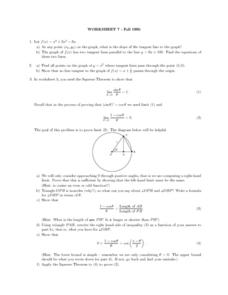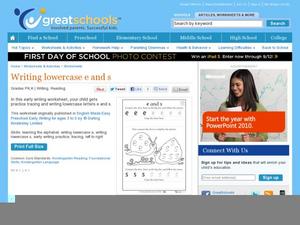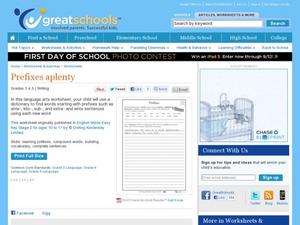Curated OER
Medial Sound u
Join Ug the Bug for some vowel sound practice focused on the short /u/ sound. Scholars examine six images and label each with a CVC word that has this as its medial phoneme. Next, they complete two rhyming sentences about Ug, using a...
Curated OER
Drawing Curvy Lines
Can your youngsters trace a curvy line? Have them guide their pencil over part of a loop, then finish the line on the right side of the page. They can fill the rest of the page with their own curvy lines. A great way to work on fine...
Curated OER
Match the Pictures
Which of these objects are the same? Get your pre-readers comfortable with identifying objects that are identical, focusing on the term same. They examine eight pictures, drawing a line between those that are the same. The objects should...
Curated OER
Practicing Straight Lines
Pre-writers get ready to print letters with this tracing worksheet. Youngsters complete two images by tracing lines. They start at each dot, following the arrows from top to bottom. There are 13 straight lines and one circle to complete,...
Curated OER
Match the Rhymes
Which ones rhyme with swing? There are six images and scholars determine which ones rhyme. Two of the words are written out below to incorporate some printing practice as scholars trace the letters to form each single-syllable word....
Curated OER
g and q
Give printing practice a creative spin as young writers become familiar with the lowercase letters g and q. They trace each letter four times before printing a set on their own in the space provided. The fun twist is that scholars use...
Curated OER
p and b
Give your beginning printers some kid-friendly practice with the letters p and b that will ignite their artistic side. They connect the dots to trace the lowercase letters before copying them in the space provided. There are two pictures...
Curated OER
r and n
Here is some kid-friendly practice with the letters r and n that will ignite your scholars' artistic sides. They connect the dots to trace the lowercase letters before copying them in the space provided. There are two pictures they...
Macmillan Education
Understanding Poetry (Elementary)
Introduce young readers to poetry analysis with a worksheet that uses Emily Bronte's "Spellbound" to model how poets use word choice, the sounds of words, the repetition of words, and rhyming patterns to create the mood, tone, and...
Curated OER
Worksheet 7: Slope and Tangents
Providing both review and practice problems, this worksheet prompts students to answer five questions having to do with slope, tangents lines, graphing, the Squeeze Theorem, differentiable functions and derivatives. This activity could...
Curated OER
Phonics: Beginning and Ending Sounds
What does the word door start with? Little ones will look at each of the eight images, say them, then fill in the initial or final phoneme that is missing. Afterward, they play an independent game where they think of other words that...
Curated OER
Questions
Explore end punctuation with this multi-step worksheet on question marks. Scholars begin by finishing 10 sentences with either a period or a question mark. Consider discussing patterns they see at this point (first word, inflection,...
Curated OER
Synonyms
Help keep your writers from using the same words in their writing: introduce them to synonym. Learners read a brief explanation of synonyms with examples. Then, they fill in a chart by writing synonyms for six adjectives. Consider having...
Curated OER
Odd One Out
Which of these wacky shapes is different? Learners examine five rows of figures, each with a starting shape at the beginning. They determine which of the four following shapes looks different from the first, circling it. Consider having...
Curated OER
Writing a Book Review
Introduce literary analysis, writing skills, and purposeful reading with a book review. Pupils answer five questions that ask about plot, characters, language used, story elements, and the main character. This is a wonderful way to start...
Curated OER
Statements and Questions
Teach your class the differences between statements and questions with a simple activity. After reading four statements, third graders rewrite the sentences as questions. They do the opposite in the last section. A helpful activity for...
Curated OER
Connect the Rhymes
Pre-readers benefit from visual context clues like the ones in this rhyme worksheet. There are two sets of objects here, and scholars connect objects on the left with their rhyming counterparts on the right. Each word has the vowel...
Curated OER
Find the Letters
It's an alphabet treasure hunt in this beginning spelling activity. Learners examine eight jumbled letters inside a picture of a dog, circling the letters in the word dog. Then, they do the same for the word hat. An advantage to this...
Curated OER
Similes
Similes are a great way to get your writers thinking about descriptive details. They read a brief explanation which covers clichés and the general wording of a simile. Then, learners try a few on their own. First, they complete nine...
Curated OER
Vowels and Consonants
Now that your scholars know the alphabet, make sure they understand that not all letters are the same! Explore the difference between vowels and consonants...not to mention that pesky y. Learners say the alphabet out loud and observe...
Curated OER
Writing Lowercase e and s
Get familiar with the letters e and s. Two lovely snails need your class to trace the letters on their backs. After that, they can trace and then copy each letter for good measure.
DK Publishing
Numbers 1 to 20
Practice writing numbers with fun kites. Kindergartners will rise to the highest height as they match the numbers to their correct written forms: 11 to eleven, 14 to fourteen, etc. Use this resource as a class activity or as a review...
Curated OER
Prefixes Aplenty
Introduce several new prefixes to your vocabulary lesson. After alphabetizing 19 prefixes, including pro-, geo-, and thermo, third graders use a dictionary to find one word that begins with each prefix. Extend the activity by having kids...
Curated OER
Verb Tenses
Discover how to use proper verb tenses with context clues. Five sentences help first graders decide if they should use -ed or -ing to end simple verbs. Each sentence provides context clues to indicate the time. Use the resource in...

























